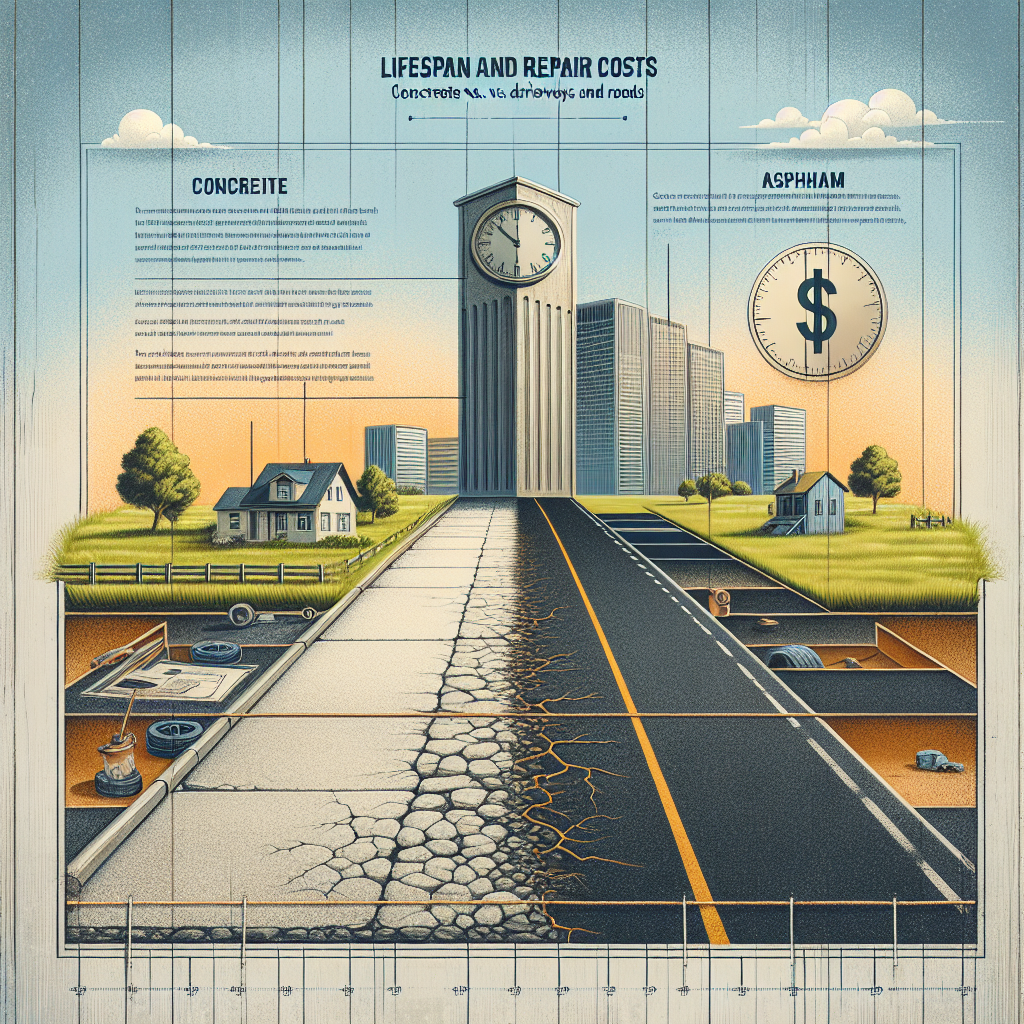When it comes to choosing the right material for driveways and roads, homeowners and property managers often find themselves at a crossroads: concrete or asphalt? Each material has its unique benefits and drawbacks, but understanding their lifespan and repair costs can help you make a more informed decision. In this article, we will explore the differences between concrete and asphalt, focusing on durability, cost-effectiveness, maintenance, and beyond.
The Lifespan of Concrete vs. Asphalt
Concrete: Built to Last
Concrete driveways and roads typically have a longer lifespan than their asphalt counterparts. On average, a concrete installation can last anywhere from 25 to 30 years with proper maintenance. This longevity is attributed to concrete’s strong resistance to weather elements, heavy loads, and general wear and tear.
Concrete’s durability does come with some considerations. In colder climates, it can be susceptible to cracking due to freeze-thaw cycles. However, advancements in concrete technology and proper installation techniques can mitigate many of these issues.
Asphalt: Shorter Yet Effective
Asphalt driveways and roads, though initially cheaper to install, generally have a shorter lifespan, lasting around 15 to 20 years. They are more flexible, which can help them withstand occasional heavy traffic and weather fluctuations. However, they can also be prone to softening in extreme heat and may be more easily damaged by heavy loads over time.
Weather Impact on Lifespan
Both materials can be affected by environmental factors. For instance, extreme weather, whether it be excessive rainfall or high temperatures, can impact both concrete and asphalt differently. Understanding your local climate can play a significant role in determining which driveway material is best for your property.
Repair Costs: Concrete vs. Asphalt
Repairing Concrete: A Costly Affair
When it comes to repair costs, concrete poses a greater financial burden. If significant damage occurs—such as large cracks or sections that have settled—you may need to engage in extensive repairs like slab replacement or resurfacing. These repairs can range from $300 to $700 or more, depending on the severity of the damage.
In general, while concrete requires less frequent repairs, the costs can be substantial when issues arise. Therefore, it’s essential to budget for these eventualities when investing in a concrete driveway or road.
Asphalt Repairs: More Affordable Solutions
In contrast, the repair costs for asphalt are typically much lower. Small cracks can easily be filled for as little as $100 to $300, while larger sections can be resurfaced or repaved for about $1 to $3 per square foot. Plus, maintenance is often less intensive—sealcoating every couple of years can extend the lifespan of your asphalt surface and is relatively inexpensive.
However, it is worth noting that while asphalt repairs may be cheaper, they do occur more frequently. Regular maintenance is crucial to ensure that an asphalt driveway remains in good shape.
Maintenance Requirements: What to Expect
Concrete: Low Maintenance, High Cost
Although concrete may have a higher repair cost, it is low maintenance compared to asphalt. An occasional power wash, sealing every few years, and filling minor cracks can keep your concrete driveway looking pristine. However, if climate issues begin to affect it, you may want to invest in more robust maintenance.
Asphalt: Maintain Regularly for Longevity
Conversely, maintaining asphalt requires more frequent actions. Regular sealcoating, ideally every 2 to 3 years, can prevent damage from UV rays and water intrusion. While this may seem like an extra burden, the lower costs associated with maintenance can save you money in the long run.
Conclusion: Making the Right Choice for Your Driveway
Choosing between concrete and asphalt for your driveway or road ultimately depends on your circumstances, budget, and preferences. Concrete offers longevity and lower maintenance but comes with higher repair costs when issues arise. On the flip side, asphalt is more cost-effective upfront and cheaper to repair but requires more frequent maintenance and care.
By weighing the lifespan and repair costs, you can make a well-informed decision that meets your needs. Whether you go with concrete or asphalt, ensuring you work with reputable contractors and set aside a budget for maintenance will pave the way for a smooth, long-lasting surface for years to come. Remember, the road you choose should enhance not only your property but also your daily life—so consider your options wisely!


